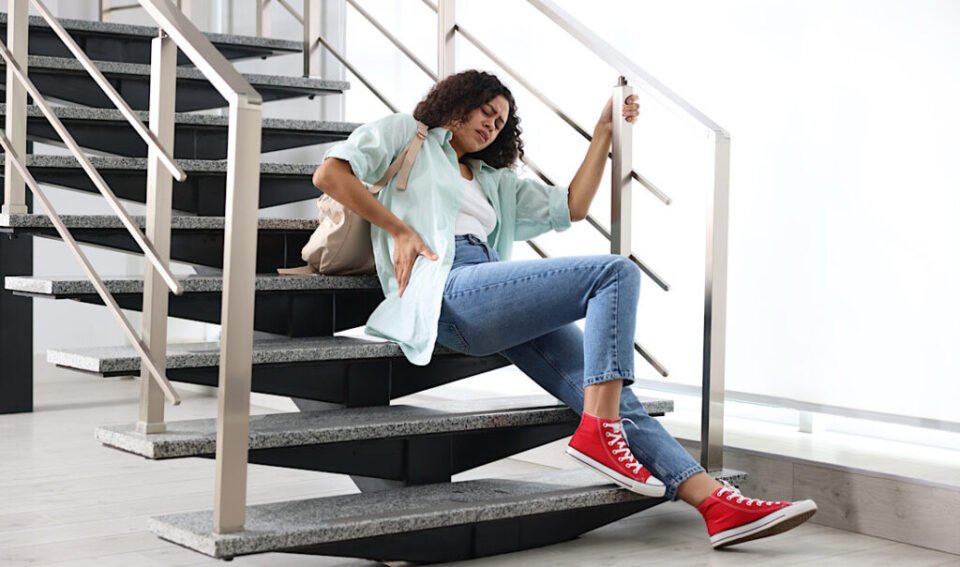Slip and fall accidents can happen almost anywhere — in a grocery store, apartment hallway, parking lot, or stairwell. But figuring out who is actually responsible for your injuries isn’t always simple. The rules that apply to a fall in a store might be very different from those in a residential property.
In New Jersey, the key concept in these situations is premises liability — the legal idea that property owners (and sometimes tenants) have a duty to keep their spaces reasonably safe for others. The level of responsibility depends on where the fall happened, who controls the property, and whether the owner knew or should have known about the hazard.
Here’s a breakdown of how responsibility is determined after a slip and fall in a store versus an apartment building, and what steps you can take if you’ve been injured in either situation.
Slip and Falls in Stores and Other Businesses
When you enter a store, restaurant, or other commercial property, the owner has a legal duty to keep the premises safe for customers. This means regularly inspecting the floors, aisles, and parking lots for hazards such as:
- Wet or freshly mopped floors without warning signs
- Spilled liquids or food
- Uneven or cracked walkways
- Poor lighting in stairways or parking lots
- Loose mats or rugs near entrances
If an employee or manager knows about a dangerous condition and doesn’t fix it promptly — or fails to warn customers about it — the business can be held liable for any resulting injuries.
Even if the store didn’t know about the hazard, it may still be responsible if it should have known. For example, if a spill sat on the floor for 30 minutes and no one cleaned it up, that’s considered negligence. Stores are expected to inspect their properties regularly and take reasonable steps to prevent accidents.
Evidence That Strengthens a Store Slip and Fall Case
If you’re hurt in a store, it’s important to document as much as possible right away. Try to:
- Take photos or videos of the hazard and your injuries.
- Report the accident to a store manager and ask for a copy of the incident report.
- Get witness statements if anyone saw the fall or noticed the unsafe condition before it happened.
- Save your shoes and clothing, as they may help demonstrate that the hazard caused your fall.
Stores often have surveillance cameras, but footage can be erased quickly. Contacting an attorney as soon as possible helps ensure that important evidence is preserved before it disappears.
Slip and Falls in Apartment Buildings
Falls in apartment complexes or rental properties raise different questions about responsibility. In these cases, liability depends on who controls the area where the fall occurred.
Generally, landlords and property managers are responsible for maintaining common areas — such as hallways, stairwells, sidewalks, lobbies, and parking lots. They must keep these areas clean, well-lit, and in good repair.
Common causes of apartment building falls include:
- Broken or missing handrails
- Torn carpeting in hallways
- Leaking pipes creating puddles
- Ice or snow on walkways
- Poorly lit stairways
If your fall happened inside your apartment, the situation may be different. Tenants are usually responsible for keeping their own units safe. However, if a landlord ignored a maintenance request (like a leaking ceiling or defective flooring), they could still be held liable if that neglect led to your injury.
Proving Negligence in Apartment Fall Cases
To hold a landlord or property owner accountable, you need to show that:
- The owner or manager knew or should have known about the dangerous condition.
- They failed to fix it or provide a proper warning within a reasonable time.
- That failure directly caused your injury.
For example, if tenants complained for weeks about a broken stair but nothing was done, and you later fell on it, that’s strong evidence of negligence. On the other hand, if the hazard appeared only moments before your fall, proving the landlord’s knowledge may be more difficult.
Shared Responsibility: When More Than One Party Is Liable
Sometimes, more than one party shares responsibility. In a large apartment complex, the property management company might handle day-to-day maintenance, while the building owner oversees major repairs. In commercial settings, both the store and the landlord might be partially at fault — for example, if the store failed to clean up a spill, but the landlord ignored a leaky ceiling that caused it.
An experienced attorney can help identify all potentially responsible parties, which increases your chances of receiving full compensation for your injuries.
When to Call a Slip and Fall Attorney
Determining who’s at fault in a slip and fall accident can be confusing, especially when multiple people or companies are involved. That’s why it’s so important to have legal guidance early on. A lawyer can investigate the incident, review maintenance records, gather witness statements, and negotiate with insurance companies on your behalf.
If you’ve been injured in a slip and fall accident at a store or apartment building, reach out to The Law Offices of Anthony Carbone. With more than 35 years of experience helping Jersey City residents recover after preventable accidents, Attorney Carbone and his team understand how to navigate complex premises liability cases and fight for the compensation you deserve.
Final Thoughts
Slip and fall accidents might seem minor at first, but they can cause long-term pain, missed work, and unexpected medical bills. Whether your accident happened in a store, a rental property, or anywhere else in Hudson County, knowing who’s responsible — and how to prove it — is key to getting justice. By acting quickly and seeking experienced legal help, you can protect your rights and move toward recovery with confidence.

